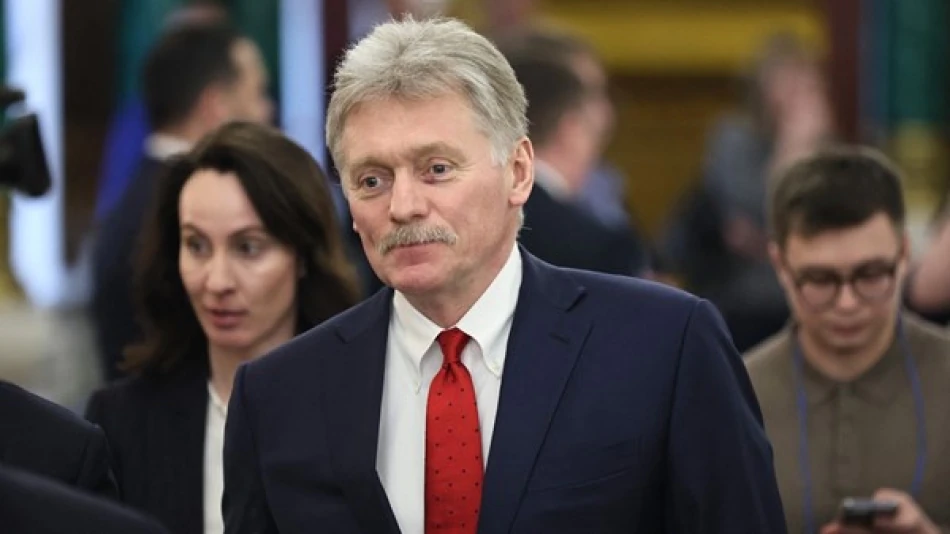
Russia Urges Pressure on Ukraine to Restart Peace Talks: A Critical Diplomatic Standoff
Russia Calls for International Pressure on Ukraine as Trump's Mediation Efforts Face Early Setbacks
The Kremlin is urging the international community to pressure Ukraine into resuming peace negotiations, placing particular emphasis on President Donald Trump's administration to lead mediation efforts. The call comes as Moscow signals readiness for a third round of talks while expressing disappointment with early diplomatic signals from Washington.
Moscow's Diplomatic Strategy Targets Trump Administration
Kremlin spokesperson Dmitry Peskov made clear Wednesday that Russia views the United States—specifically Trump and his team—as the primary mediator capable of bringing Ukraine back to the negotiating table. This represents a calculated diplomatic move, leveraging Trump's campaign promises to end the conflict quickly while testing his administration's actual commitment to peace talks.
"We call on everyone to do this," Peskov stated, referring to pressuring Ukraine. "The main efforts are the mediation efforts being made by the United States—President Trump and his team. Many statements have been made, and many of them expressed disappointment. Of course, we hope that pressure will be exercised in parallel on the Ukrainian side."
The Stalled Negotiation Process
Russia's push for renewed talks highlights the current diplomatic deadlock. Despite Moscow's stated readiness for a third round of negotiations, no concrete proposals have emerged from Kyiv. The previous two rounds—held in Belarus and Turkey during the early months of the conflict—failed to produce lasting agreements, with both sides ultimately walking away from tentative frameworks.
This pattern reflects a broader challenge in the conflict: while both parties occasionally signal openness to dialogue, fundamental disagreements over territorial concessions, security guarantees, and Ukraine's international alignment remain unresolved.
Weapons Supplies: Business as Usual Despite Diplomatic Overtures
Peskov's response to questions about continued U.S. weapons shipments to Ukraine reveals Moscow's pragmatic approach to the arms flow. Describing it as "a business matter," he noted that supplies have continued uninterrupted and weren't expected to stop immediately.
However, the Kremlin drew a distinction regarding long-range missiles, emphasizing that Trump has not committed to providing such weapons systems. This suggests Russia views certain categories of military aid as more escalatory than others, potentially creating space for diplomatic maneuvering.
Testing Trump's Peace Promises
Russia's appeal to Trump reflects both opportunity and strategy. Throughout his campaign, Trump criticized the scale of U.S. support for Ukraine and promised to end the conflict rapidly. Moscow appears to be testing whether these campaign positions translate into actual policy shifts.
The Kremlin's expression of "disappointment" with early Trump administration statements suggests that initial diplomatic contacts may not have met Russian expectations. This could indicate that Trump's team is maintaining more continuity with previous U.S. policy than Moscow anticipated.
Implications for Global Stakeholders
For European allies, Russia's focus on U.S. mediation could signal an attempt to bypass EU involvement in future peace processes. This would represent a significant shift from earlier diplomatic frameworks that included European powers as key mediators.
The timing of these statements also coincides with ongoing debates in Washington about the sustainability of current aid levels to Ukraine. Russia's call for international pressure may be designed to exploit potential war fatigue among Western publics and policymakers.
As the conflict enters its third year, Russia's diplomatic positioning suggests Moscow believes the changing U.S. administration presents its best opportunity for achieving negotiated outcomes that previous talks failed to deliver. Whether this assessment proves accurate will largely depend on how Trump's stated desire to end the conflict aligns with Ukraine's negotiating position and European security concerns.
Most Viewed News

 Layla Al Mansoori
Layla Al Mansoori






